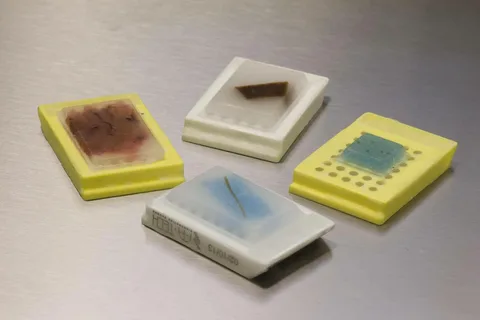What makes formalin-fixed paraffin-embedded (FFPE) breast tissue samples so valuable in medical research and diagnostics? Their ability to preserve biological information for extended periods enables groundbreaking discoveries and precise diagnoses. These samples are an essential tool in the fight against breast cancer and other diseases. Let’s explore their role in driving medical progress.
The Importance of Preserved Tissue Samples
FFPE sections, derived from breast tissue samples, are a cornerstone of pathological studies. The process involves fixing tissue in formalin and embedding it in paraffin, preserving its structural and molecular integrity. This preservation method allows researchers to analyze samples long after collection.
These sections are particularly useful in breast cancer research, helping scientists identify biomarkers and study tumor behavior. By examining preserved tissues, researchers can compare past and present cases to uncover patterns. This contributes to improved diagnostic methods and targeted treatments. This technology ensures that valuable data remains intact, paving the way for medical breakthroughs.
Enhancing Breast Cancer Research
FFPE breast tissue samples have revolutionized cancer research. They allow scientists to study cancerous and non-cancerous tissues under controlled conditions. This enables a deeper understanding of how breast cancer develops and progresses. Researchers can identify genetic mutations, protein expressions, and cellular changes linked to breast cancer. These findings help refine diagnostic criteria and develop targeted therapies.
Additionally, these samples provide insights into how different cancers respond to treatments. This knowledge improves personalized medicine, ensuring that patients receive therapies tailored to their needs.
Applications in Clinical Diagnostics
FFPE samples play a crucial role in clinical diagnostics. Pathologists use these preserved tissues to confirm disease diagnoses and evaluate the effectiveness of treatments. The ability to analyze tissues in detail supports more accurate assessments.
Key applications include:
- Biomarker identification for early detection of diseases.
- Histological analysis to study tissue structure and abnormalities.
- Immunohistochemistry for identifying specific proteins in tissues.
- Genetic testing to uncover mutations or genetic predispositions.
- Comparative studies between different patient groups.
These diagnostic tools enhance patient care and provide critical data for clinical decision-making. FFPE samples are indispensable for improving healthcare outcomes.
Long-Term Conservation of Samples
Samples that have been properly kept can be used for years to come, providing a useful resource for further research. This enables researchers to use contemporary methods on older samples and reexamine past cases. Make sure to collaborate with a reputable company to ensure high-quality samples and effective results.
Longitudinal investigations, in which scientists monitor the course of an illness across time, are supported by preservation. Large-scale initiatives like building sample banks for research are also made possible by it. By ensuring that no important data is lost, FFPE technology enables researchers to expand on earlier findings. These samples’ long-term usefulness makes a substantial contribution to advances in medicine.
Reliable Sources for High-Quality Preserved Tissue Samples
Accessing high-quality preserved tissue samples is critical for accurate research and reliable diagnostic outcomes. Trusted providers ensure that tissue samples meet stringent standards for preservation and integrity, offering researchers and clinicians the tools they need to advance medical progress. Whether for biomarker discovery, histological analysis, or genetic testing, these samples provide a solid foundation for breakthroughs in cancer research and other fields. Collaborating with a dependable supplier ensures consistency, precision, and success in your projects.
FFPE breast samples are a cornerstone of medical research and diagnostics. Their ability to preserve structural and molecular data makes them indispensable for studying diseases like breast cancer. From FFPE sections to innovative diagnostic applications, these samples are driving advancements in healthcare. By enabling detailed analyses and supporting long-term studies, they pave the way for more precise treatments and better patient outcomes. Their role in medical progress is invaluable and grows with new innovations.






